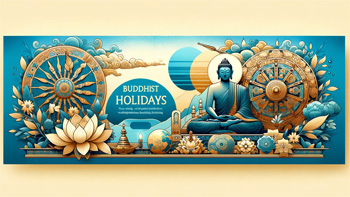Buddhist holidays, observed by millions around the world, offer a window into the spiritual and cultural practices of Buddhism. These holidays are not just moments of celebration but are imbued with deep philosophical and religious significance. They provide opportunities for reflection, remembrance, and renewal of faith.
Vesak: The Buddha's Birthday
Vesak, also known as Buddha Purnima or Buddha Day, is one of the most important Buddhist festivals. It commemorates the birth, enlightenment (Nirvana), and death (Parinirvana) of Gautama Buddha. This day is observed on the full moon day of the ancient lunar month of Vesakha, which usually falls in May or June. Devotees gather in temples to meditate, offer prayers, and partake in ceremonial releases of lanterns or doves as symbols of liberation. The day is marked by acts of kindness and charity, reflecting the Buddha's teachings on compassion.
Asalha Puja: Honoring the First Teaching
Asalha Puja, also known as Dharma Day, celebrates the Buddha's first teaching after his enlightenment, known as the 'Turning of the Wheel of Dharma'. This event is observed on the full moon of the eighth lunar month, typically in July. The day is commemorated through recitations of the Buddha's first discourse and participation in religious discussions. It is a time for practitioners to reflect on the teachings and deepen their understanding and practice of the Dharma.
Uposatha: The Buddhist Observance Days
Uposatha days are observed four times each lunar month, aligning with the phases of the moon. These days are dedicated to intensified meditation, observance of precepts, and renewal of commitment to Buddhist practices. Uposatha is a time for spiritual reflection and making merit through good deeds, fasting, and participating in temple rituals. It serves as a regular spiritual cleanse and a reminder of the Buddhist path.
Magha Puja: Commemorating the Sangha
Magha Puja, also known as Sangha Day, is celebrated on the full moon of the third lunar month (usually in February or March). It commemorates a spontaneous gathering of 1,250 disciples of the Buddha, leading to the establishment of the Buddhist monastic community. Devotees gather to make merit, participate in candlelit processions, and reaffirm their commitment to the Buddha's teachings. This holiday emphasizes the importance of the Sangha (monastic community) in Buddhism.
Losar: The Tibetan New Year
Losar, the Tibetan New Year, is a significant holiday in Tibetan Buddhism. It marks the beginning of the lunar new year and is celebrated over several days with rituals, dances, and traditional foods. Losar is a time for cleansing out the old and welcoming the new, symbolizing new beginnings and hopes. Monasteries are adorned, and special prayers and ceremonies are conducted to invoke blessings for the year ahead.
Obon: The Festival of the Dead
Obon, a Japanese Buddhist festival, honors the spirits of ancestors. It is celebrated in July or August, depending on the region. The festival includes family reunions, visits to ancestral graves, and traditional dances known as Bon Odori. Lanterns are lit and floated on water, guiding the spirits back to their world. Obon is a blend of joyous celebration and solemn remembrance, highlighting the Buddhist teachings on filial piety and the interconnectedness of life and death.
Kathina Ceremony: The Offering of Robes
The Kathina ceremony is a traditional Buddhist festival held at the end of the Vassa, the three-month rainy season retreat for monks. During Kathina, lay Buddhists offer new robes and other necessities to the monastic community. This practice symbolizes the strong bond between laypeople and monks and the mutual support on the path of Dharma. Kathina is an expression of gratitude and generosity, fundamental virtues in Buddhist teachings.
Parinirvana Day: Remembering the Buddha's Passing
Parinirvana Day, observed in February, marks the death of Gautama Buddha and his entry into Parinirvana, the final nirvana after death. It is a day of contemplation on the impermanence of life. Buddhists engage in meditation, read scriptures, and participate in talks or teachings focused on the life and death of the Buddha. Parinirvana Day is an opportunity to reflect on one's own life and mortality, and the journey towards enlightenment.
Buddhist holidays offer a rich tapestry of cultural and spiritual practices that deepen understanding and foster a sense of community among practitioners. They are not just commemorations of historical events but are living traditions that continue to guide and inspire Buddhists in their daily lives and spiritual journeys. Through these observances, the fundamental teachings of Buddhism are brought to life, nurturing a path of compassion, wisdom, and mindfulness.
